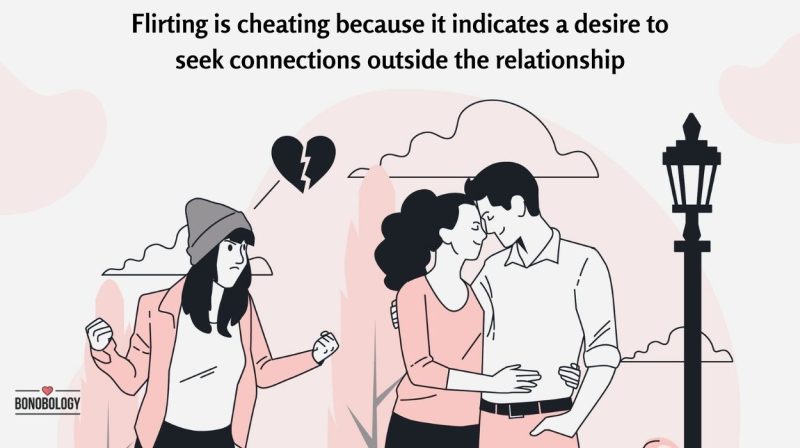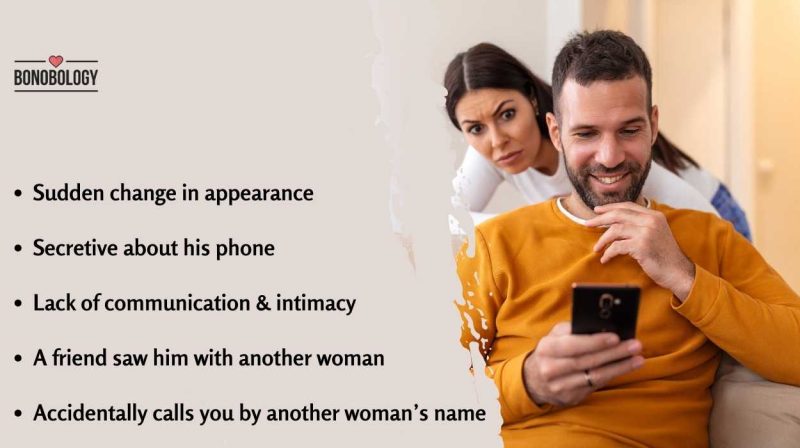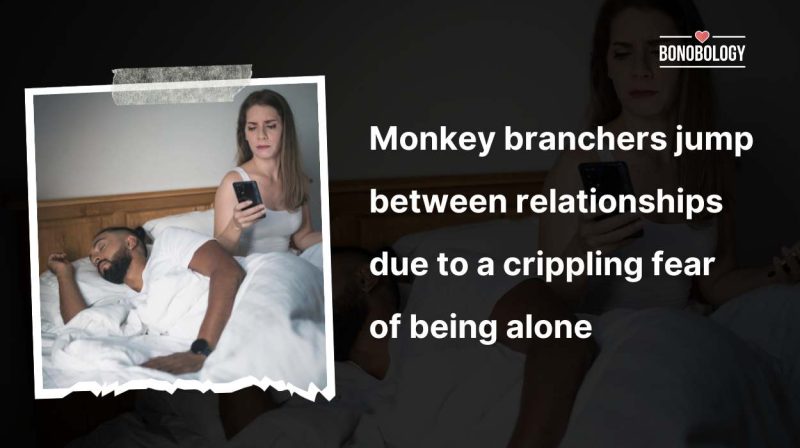In my relationships, the boundaries regarding interacting with the opposite sex have always been a source of heartache and confusion. Even after we set boundaries, we still end up hurting each other once in a while. I’ve learned that setting boundaries does not mean the end of difficult questions for each other, like: “Is flirting cheating in a relationship for you?”
In the realm of romantic relationships, the boundary between innocent behavior and insensitive flirting is often blurry. Flirting often starts with a playful exchange of words or subtle gestures, and has long been a controversial subject in the world of dating and commitment. Is it simply “innocent flirting” or is flirting a form of cheating?
The dynamics of modern relationships are evolving, with technology and changing societal norms adding new dimensions to the concept of fidelity. To help you make sense of this emotional minefield, we’ll explore nine compelling reasons that we should consider flirting a form of cheating and seven ways it can harm a monogamous relationship.
Is Flirting Considered Cheating? 9 Reasons It Is
Table of Contents
Before committing to a partner, plan conversations regarding boundaries and discuss what is considered cheating by them. Flirting, a practice often viewed as harmless, can ignite passionate debates among couples seeking to understand where the line is drawn. The fact is that fidelity is a cornerstone of trust and commitment in a monogamous relationship, which is why flirting while in a relationship is highly disrespectful. After all, people flirt to signal sexual interest, so at the very least, it’s a warning sign.
On whether or not flirting constitutes cheating, one Reddit user says, “I think it falls under emotional cheating. Even if it’s a “joke”… it signals a deeper issue. Why would your partner want to give that kind of attention to someone other than you? I’d be livid and immediately lose a lot of trust. The severity of the offense obviously depends on the context, content, and intent. It’s probably not automatically relationship-ending, but it’s absolutely indicative of the need for loooonnngggg conversations (possibly mediated by a therapist) about the relationship, trust, and boundaries.”
Related Reading: 10 Telltale Signs You Are Not Ready For A Serious, Committed Relationship
What about this: Is flirting considered cheating in the virtual world? Interestingly, studies have found that flirting in a virtual reality setting – with a virtual partner, not a real person – is effective in “inoculating” people from the desire to seek out real-life alternatives. A promising development for people who struggle to remain faithful.
So, when does flirting cross the line into the sure label of cheating? Let’s explore nine reasons to support this position. I hope it helps you examine the motivations and consequences of your actions.
1. Flirting is a form of emotional infidelity
Is flirting cheating if there is no physical contact? It could be. Emotional infidelity is a breach of trust within a romantic relationship that doesn’t involve physical cheating. It occurs when one partner develops a deep emotional connection with someone outside the relationship, typically in a way that’s reserved for their primary partner. This is one reason that flirting while in a relationship is highly disrespectful.
While emotional infidelity is more serious, flirting may be a lighter or more casual form of emotional cheating. You may not be sharing intimate details about yourself with this new person but your innocent flirtation does have sexual overtones. If having sex with someone else is cheating, then flirting can be considered micro-cheating. In fact, one study defines infidelity as “behavior that is not condoned by one’s romantic partner, occurs outside of the primary relationship, and can be described, such as intercourse, flirting, etc.” This is why flirting counts as emotional cheating.
Related Reading: Can A Relationship Survive Cheating? 7 Factors That Determine The Outcome
2. It involves deception and secrecy
When is flirting considered cheating? Flirting most often happens in secrecy. Even when other people are around, one of the thrills of flirting lies in the fact that no one else knows what’s happening right in front of them. And then there’s flirting at work while in a relationship, which is even more secretive. But this secrecy is a violation of your partner’s trust and messes with their head even if it is super casual and there is truly no infidelity, emotional or physical. Another reason that flirting while in a relationship is highly disrespectful.
And how does harmless flirting constitute emotional cheating? Deception and secrecy chip away at the foundation of a healthy relationship causing it to erode over time. In fact, a study has found that deception can go into other areas of the relationship, such as finances. A consistent pattern of deception and secrecy can create strain and discord within the relationship. When your partner realizes you’ve been keeping things from them, this betrayal can be emotionally devastating.
Related Reading: When Is Texting Cheating? 11 Different Scenarios And How To Deal
3. Flirting indicates attraction
Is flirting considered cheating even if there is no physical contact? Whether or not you are in a committed relationship, the intention behind flirting is to get someone to feel attracted toward you. So, seen through this lens, an intent to attract others while in a committed relationship or even just entertaining others while in a relationship are acts of infidelity. To behave amorously with someone besides your primary partner amounts to cheating. A person flirting with someone might do so with any of these intentions:
- External validation: Flirting with serious intent to attract others often stems from a need for validation, beyond what one receives within the primary partnership. Seeking attention from others can provide a sense of desirability and self-worth
- Escapism: For some, flirting offers an escape from the routine or challenges of their committed relationship. It can be a way to experience the thrill of something new and different, creating a sense of excitement or novelty that might be missing in their everyday life
- Ego boost: Flirting can serve as an ego boost. Compliments and expressions of interest from others can temporarily elevate self-esteem. The person may not otherwise receive this confidence boost from their partner or from themselves
Related Reading: The 7 Stages Of Emotional Affairs: Reasons And Tips To Recover
4. It can escalate to full-blown cheating
Even harmless flirting has sexual overtones a lot of times. So, is flirting cheating in a relationship? Yes, because if left unchecked, it could progress into the following scenarios:
- Even though it begins with light, playful banter or harmless compliments, over time, these interactions can intensify feelings of attraction and desire for the other person
- This makes it more challenging to maintain clear boundaries with them
- As flirtation deepens, it can foster an emotional connection with the other person
- Emotional bonds are often precursors to more intimate involvement, as individuals start to share personal thoughts, feelings, and experiences
- Additionally, hedonic responses in the brain are very difficult to resist. What begins as harmless flirting may lead to crossing established boundaries within the primary relationship. This can involve sharing too much private information, even about your partner or conflicts, or engaging in provocative discussions
- When does flirting cross the line? When harmless flirting eventually becomes something decidedly less harmless — physical intimacy
5. It causes jealousy and insecurity
Is flirting cheating when there is intent to attract others? Yes, if the intent is just to make your partner jealous, you’re definitely betraying them. Insecurity and jealousy in a relationship are emotional reactions that can be triggered within a romantic relationship when one partner engages in flirtatious behavior or when there’s a perception that the boundaries of the relationship are being tested.
This also includes when a partner allows others to flirt with them, even if they don’t flirt back. As one Reddit user puts it, “My boyfriend is an extremely nice guy … Given this, a lot of women he meets through sports and work flirt and show romantic interest in him despite knowing he’s in a relationship.
In some cases, they do it right in front of me and say nasty things behind my back while pretending to be nice and fun in front of my boyfriend. Chalk this up to insecurity, but it is growing so frustrating because of the sheer lack of respect these women have for our relationship and it’s turning me into someone I’m not (always having my guard up and being nervous when he’s around women).”
6. You fall into the comparison trap
Comparisons in a committed relationship often cause feelings of insecurity. It can be triggered when one partner flirts with someone else, especially when the affected partner is already going through a tough time. Such open acts of insensitivity can strain the relationship. The partner who feels compared to others may become resentful, feeling that they can never live up to the idealized image their partner holds of others. You’re basically cheating your partner of stability in the relationship.
7. It diminishes emotional connection
A strong emotional connection relies on effective communication. When one or both partners engage in flirtatious behavior and withhold information or emotions, the flow of open communication can become strained. This can lead to misunderstandings, misinterpretations, and unresolved issues.
The emotional energy that should be directed toward nurturing the relationship might be getting redirected to others. This emotional investment in external relationships can lead to neglect of the primary partnership. So, if you’re asking yourself, “Is flirting cheating?”, think about the effect your flirting has on the intimacy with your partner.
Related Reading: The 8 Commandants Of Open Communication In A Relationship
8. Flirting breaks down trust
A partner flirting with others could cause an erosion of trust, especially if their flirting is a habit. A significant breakdown of trust can have long-lasting consequences:
- Telling the affected partner that it’s “just innocent flirting” invalidates their feelings and constitutes a form of gaslighting
- It can lead to emotional detachment, chronic suspicion, and, in severe cases, the dissolution of the relationship
- The partner who feels betrayed will not be able to trust their partner’s one truth among the many lies
It’s crucial to address this issue and discuss boundaries before the trust between the two of you is completely gone. Rebuilding trust in a relationship takes time and effort from both partners. It involves gentle, transparent communication, setting and respecting boundaries, addressing the underlying issues that led to the breakdown, and demonstrating consistent reliability and honesty.
Related Reading: 11 Common Reasons People Cheat In Relationships
9. It violates relationship agreements
Relationship agreements can encompass a wide range of rules and boundaries, depending on the specific needs and preferences of the individuals involved. Common agreements include guidelines related to monogamy, exclusivity, conversations with others, and boundaries for social or physical interaction outside the relationship.
Ignoring or breaching your partner’s boundaries by flirting while in a committed relationship is a violation of relationship rules. This violation directly impacts trust, leading to a loss of relationship satisfaction that can be challenging to repair. You wouldn’t be so ready to breach a work agreement, so why disrespect a relationship agreement by flirting at work while in a relationship? Or by hitting on a new friend whose intentions your partner warned you about?

7 Ways Flirting While In A Relationship Can Be Harmful
How can flirting hurt your partner? According to research, flirting while in a committed relationship can have several harmful consequences, impacting the relationship’s dynamics and the well-being and mental health of both partners. The study says, “Interacting online with attractive strangers provides the extra push needed to pursue short-term pleasures rather than the long-term goal of relationship maintenance.”
Here are seven ways it can be detrimental when flirting crosses the line:
1. Emotional distance
Entertaining others while in a relationship can lead to emotional distance between partners. When one person engages in flirtatious behavior, it can create a sense of emotional detachment, making it challenging to maintain the closeness necessary for a strong and fulfilling relationship.
2. Resentment and hurt
The partner who feels hurt or betrayed by the flirtatious behavior may harbor feelings of resentment and hurt. These hurt feelings can linger and create a rift in the relationship that requires time and effort to heal.
Related Reading: 6 Cheaters Tell Us How They Feel About Themselves
3. Communication breakdown
Flirting can lead to a breakdown in open and honest communication. Partners may become less inclined to share their thoughts, feelings, and concerns due to fear of judgment or previous conflicts related to flirtatious behavior.
4. Strained intimacy
Emotional and physical intimacy can be significantly strained by flirtation. The person engaging in flirtatious behavior may invest emotional energy outside the relationship, leaving their partner feeling emotionally neglected and physically or sexually distant.
5. Distrust of intentions
Flirting often results in the partner becoming suspicious of the flirtatious individual’s intentions. This lack of trust can extend beyond the specific situation, causing ongoing distrust in the relationship.
6. Impact on self-esteem
The partner who feels compared to or threatened by the other person may experience a decrease in self-esteem and self-worth. This comparison can lead to feelings of inadequacy and insecurity, or a lack of perceived attractiveness, which can negatively impact their mental health.
Related Reading: 12 Signs Your Partner Is Guilty Of Snapchat Cheating And How To Catch Them
7. Potential for further infidelity
The flirtatious behavior may escalate and lead to more serious forms of infidelity, such as emotional affairs or physical affairs. These actions can have profound consequences for the relationship, resulting in a more significant breach of trust and emotional harm.
Key Pointers
- Is flirting cheating? Flirting can indeed be considered a form of cheating within a committed relationship and can have detrimental emotional and physical consequences
- Flirting can harm a relationship in many ways. It can create emotional distance and resentment and can lead to a communication breakdown
- This kind of micro-cheating can result in erosion of trust, heightened jealousy and insecurity, as well as straining of the emotional connection
- Awareness of the implications of flirtatious behavior, open communication about different boundaries, and prioritization of the emotional well-being of the relationship ensures its strength and longevity
To sum it up, regardless of whether flirting is deemed as infidelity, the damage it can inflict upon a devoted relationship is clear. Flirting has the potential to breed distrust, create emotional gaps, and sow seeds of resentment, all of which can undermine the core strength of a thriving partnership. Open and honest communication, trust-building, and mutual respect stand as indispensable tools in preserving the vigor of any relationship. So, is flirting considered cheating? It’s up to you to discuss boundaries with your partner and decide for yourselves.
18 Promising Tips To Survive Infidelity In A Relationship — For The Betrayer And The Betrayed
Your contribution does not constitute a charitable donation. It will allow Bonobology to continue bringing you new and up-to-date information in our pursuit of helping anyone in the world to learn how to do anything.






















Featured
Evli Bir Erkeğin Size Aşık Olduğunu Gösteren 12 İşaret
11 Apps for Cheating Husbands—Catch Him Red-Handed
When Do Cheaters Realize They Made A Mistake? 10 Scenarios
5 Best Cheating Spouse Tracker Apps (Android & iPhone)
How To Catch A Cheater That Deletes Everything: 12 Hacks
33 Signs Of Micro-Cheating — Is Your Partner Guilty Of These?
7 Therapist-Approved Things To Do If Your Boyfriend Is Cheating On You
11 Heartbreaking Signs Your Husband Misses His Affair Partner
Should You Forgive A Cheater? 8 Factors To Consider
How Can You Tell If Your Fiancé Is Cheating? 15 Signs To Look Out For
Is Marriage Never The Same After Infidelity?
13 Uncommon Signs of Cheating People Wish They Hadn’t Ignored
15 Cell Phone Cheating Signs That Confirm Infidelity
Gut Feeling He’s Cheating, No Proof? 31 Signs Your Instincts Are On Point
Monkey Branching: Meaning, Signs, And Ways To Deal
Painful Message To A Cheating Boyfriend: 50 Brilliant Ideas
What To Do If You Suspect Your Husband Is Cheating But Have No Proof
Understanding Post-Infidelity Stress Disorder – Signs and Recovery Tips
15 Signs Your Husband Is Cheating On You With A Coworker
The 7 Types of Affairs and How They Affect Relationships